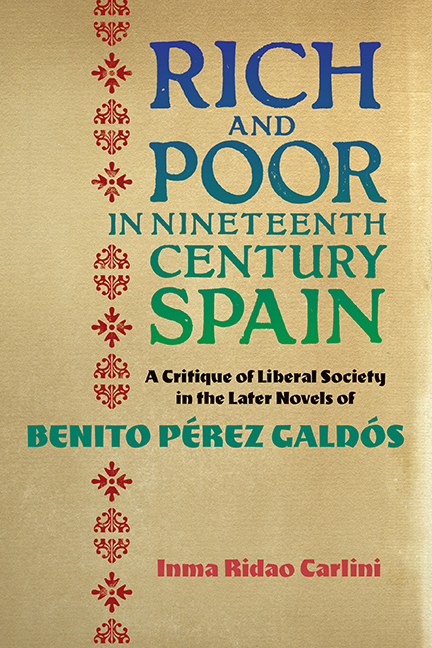 Rich and Poor in Nineteenth-Century Spain
Rich and Poor in Nineteenth-Century Spain Book contents
- Frontmatter
- Contents
- Acknowledgements
- Abbreviations
- Introduction
- 1 Changing Fortunes and the Financial World in Galdós's Lo prohibido
- 2 From Usurer to Marqués: Lending and Social Advancement in the Torquemada Novels
- 3 Revolution and the Politics of Religion in Ángel Guerra
- 4 The cuestión social in Misericordia
- Afterword
- Bibliography
- Index
3 - Revolution and the Politics of Religion in Ángel Guerra
Published online by Cambridge University Press: 05 July 2018
- Frontmatter
- Contents
- Acknowledgements
- Abbreviations
- Introduction
- 1 Changing Fortunes and the Financial World in Galdós's Lo prohibido
- 2 From Usurer to Marqués: Lending and Social Advancement in the Torquemada Novels
- 3 Revolution and the Politics of Religion in Ángel Guerra
- 4 The cuestión social in Misericordia
- Afterword
- Bibliography
- Index
Summary
Ángel Guerra (1890–91) has often been analysed in terms of the protagonists’ individual journey in search of spiritual fulfilment. This has been the approach of critics such as Casalduero (1961), Colin (1967), Correa (1962) and Jagoe (1995), among others. From this perspective, these novels, together with Nazarín and Misericordia, are seen to reflect Galdós's increasing preoccupation during the 1890s with spiritual matters. Jagoe, who refers to Ángel Guerra as ‘the most turbid and outlandish of the Novelas contemporáneas’, argues that this is a transitional novel, in which Galdós's focus begins to shift from the ‘multifarious social milieux of his earlier novels to the spiritual struggles of particular individuals’ (Jagoe 1995: 161). In the same vein, Sinnigen considers that the historical perspective that Galdós adopts in the Novelas Contemporáneas before Ángel Guerra is replaced by an effort to transcend history in the novels that follow it, particularly in Nazarín, Halma and Misericordia (Sinnigen 1978: 233–5). This view has been challenged by critics such as Fuentes Peris, who argues that these novels participate fully in contemporary social debates, especially those about poverty and charity (Fuentes Peris, 2003). Ewald, for her part, sees a deep historical engagement in Ángel Guerra, particularly in relation to the social effects of the desamortización of the 1830s (Ewald 2011). Sinnigen also acknowledges the centrality of the disentailment process in the narrative of Ángel Guerra, and argues that this is probably the novel where ‘esa política económica liberal desempeña su papel más destacado’ (Sinnigen 1996: 199).
This chapter aims to contribute further to the socio-historical reading of Ángel Guerra. As seen in the previous chapter, the question of the role of Mendizábal's desamortización in the creation of the new moneyed classes runs through the Torquemada novels. The last of the series, Torquemada y San Pedro, introduces the theme of charity as a way of redressing the negative effects of the confiscation of Church property, to great ironic effect. The question of the desamortización also underpins the narrative in Ángel Guerra, a novel written before the last three of the Torquemada novels.
- Type
- Chapter
- Information
- Rich and Poor in Nineteenth-Century SpainA Critique of Liberal Society in the Later novels of Benito Pérez Galdós, pp. 97 - 144Publisher: Boydell & BrewerPrint publication year: 2018


